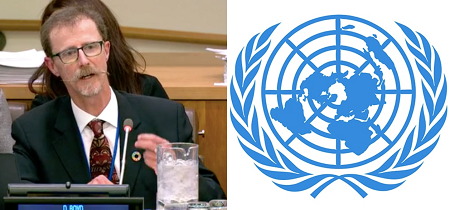Human rights and environmental due diligence laws crucial to combat irresponsible business activities – UN expert
Press release
GENEVA—Rampant deforestation, chemical and plastic production, fossil fuel exploitation and other large-scale extractive activities by business entities are harming people and the planet, a UN expert said today, introducing a blueprint for laws to curb environmental and human rights violations by corporate actors.
“Businesses operating in the global economy routinely abuse the right to a clean, healthy and sustainable environment and other human rights,” said David Boyd, UN Special Rapporteur on human rights and environment.
In the face of increasing human rights abuses by irresponsible business actors, the Special Rapporteur launched a brief containing a set of recommended elements for human rights and environmental due diligence laws. “Overlapping human rights and environmental abuses by business actors are rampant, while effective remedies for rightsholders remain elusive,” the expert said.
“Rightsholders seldom obtain effective remedies,” the expert continued “and those who do, need to navigate a host of legal, financial and other obstacles. They commonly face threats, intimidation and reprisals to themselves, their families and their communities.”
Boyd said the most vulnerable rightsholders affected by business activities—such as children, women, Indigenous Peoples, Afro-descendant Peoples, local communities, peasants, persons with disabilities and especially those whose identities extend across multiple vulnerable groups—commonly face the worst obstacles to justice and remedy.
“In the face of this stark reality, voluntary due diligence measures and existing human rights and environmental due diligence laws are simply not enough,” Boyd said.
There is widespread agreement that mandatory human rights and environmental due diligence laws are necessary to hold business actors accountable for the ways their actions harm people and the planet, the expert said.
Numerous laws are under development at the national, regional and global levels, representing a vital opportunity to advance and standardise corporate accountability. For example, the European Commission released its Proposal for a Directive on Corporate Sustainability Due Diligence earlier this year. “Its current trajectory is pathbreaking, and it would make large, regulated actors’ access to the European Union market contingent on the completion of due diligence,” Boyd said.
He said the United Nations “Legally Binding Instrument to Regulate, in International Human Rights Law, the Activities of Transnational Corporations and Other Business Enterprises” is also expected to make progress in 2022.
The expert said that despite imperfections, the draft United Nations Treaty would be the first binding global instrument to mandate due diligence covering all internationally recognized human rights—including the right to a clean, healthy and sustainable environment—for all business activities within a State Party’s territory, jurisdiction or control, including transnational activities.
In response to these legislative opportunities, the Special Rapporteur launched the brief that articulates a set of overarching goals and 10 essential legislative elements.
“If adopted, these proposals would result in legislation better equipped to prevent human rights, environmental and good governance harms by business actors, and more likely to effectively remedy those harms that occur,” Boyd said.
ENDS
David R. Boyd (Canada) was re-appointed as the UN Special Rapporteur on human rights and the environment for a three-year term commencing 1 August 2021. He is an associate professor of law, policy, and sustainability at the University of British Columbia.
Special Rapporteurs are part of what is known as the Special Procedures of the Human Rights Council. Special Procedures, the largest body of independent experts in the UN Human Rights system, is the general name of the Council`s independent fact-finding and monitoring mechanisms that address either specific country situations or thematic issues in all parts of the world. Special Procedures` experts work on a voluntary basis; they are not UN staff and do not receive a salary for their work. They are independent from any government or organization and serve in their individual capacity.
For more information and media requests please contact Viktoria Aberg (+41 22 917 9790, viktoria.aberg@un.org).
For media inquiries regarding other UN independent experts please contact Jeremy Laurence (jeremy.laurence@un.org) or Dharisha Indraguptha (dharisha.indraguptha@un.org)
Follow news related to the UN`s independent human rights experts on Twitter @UN_SPExperts.
Concerned about the world we live in?
Then STAND UP for someone`s rights today.
#Standup4humanrights
and visit the web page at http://www.standup4humanrights.org
Photo: UN Speciual Rapporteur on human rights and the envirnment David R. Boyd.














